James Joyce
Here's the link to Dubliners (on-line)
http://archive.org/stream/dubliners00joycrich#page/n7/mode/2up
Reading James Joyce’s Ulysses is no walk in the park. Why else would so many people falsely claim to have read it. (See our post from last week, 20 Books People Pretend to Read.) But Finnegans Wake is a whole ‘nother deal. Joyce’s final work is considered one of the most difficult works of fiction ever written, and contrary to Ulysses, the novel “has some claim to be the least read major work of Western literature,” according to Joyce scholar Lee Spink. Put simply, people don’t even bother reading … or pretending to read … Finnegans Wake (unless, of course, they live in China, where the novel reached the #2 position on a Shanghai bestseller list earlier this year.)
But, why don’t readers even give Finnegans Wake a shot? The illustration above perhaps says it all. The web site stammpunct.com has created a visual showing what happens when you run a page of the novel through a spell checker. It yields a lot of red, and then some more red. A framable print of this visual can be purchased at stammpunct for $35.
But, why don’t readers even give Finnegans Wake a shot? The illustration above perhaps says it all. The web site stammpunct.com has created a visual showing what happens when you run a page of the novel through a spell checker. It yields a lot of red, and then some more red. A framable print of this visual can be purchased at stammpunct for $35.
After the publication and eventual triumph of Ulysses, James Joyce spent the remainder of his life working secretively on a “Work in Progress” that he would publish in 1939 as Finnegans Wake, a novel that largely abandons the trappings of the novel and should better be called, as Anthony Burgess called it, a prose-poem—a beast that strikes the common reader as, in Burgess’ words, “too literary” and “horribly opaque.” My first encounter with this most intimidating book felt like something between hearing Italian comedian Adriano Celentano’s rapturously gibberish approximation of the sound of English in song and Michael Chabon’s detection of a “faintly Tolkienesque echo.” Like Chabon, I too could “hear the dreaming suspirations of the princess who lay sleeping in its keep.” Yet I was a bit too old for fantasy, I thought, and far too out of my depth in Joyce’s invented language, built, Burgess writes, “on the freshly uncovered roots of English.”
02:1310:34 I’ve never lost my fear of the book, and never found it accommodating to any narrative sense. And it is fearful and unaccommodating if one approaches it like a conventional novel that will yield its secrets eventually and reward the diligent reader with some sort of singular payoff. Nevertheless, the sheer pleasure one can derive—conventional expectations duly set aside—from the almost tactile quality of Joyce’s prose, its earthy, ancient, elven sounds, seems more to the point of appreciating this odd, frustrating work. Perhaps, like any well-written poem, one simply needs to hear it read aloud. Joyce himself said so, and so you can. Ubuweb brings us the entirety of Patrick Healy’s reading of the text, recorded over a four-day period in 1992 at Dublin’s Bow Lane Recording Studios. Healy’s reading is not without its faults—he rushes and stumbles at times—but that seems a mean commentary on a recording of this length and difficulty. Listen to the first installment above and the rest here. You may just have an epiphany or two.
02:1310:34 I’ve never lost my fear of the book, and never found it accommodating to any narrative sense. And it is fearful and unaccommodating if one approaches it like a conventional novel that will yield its secrets eventually and reward the diligent reader with some sort of singular payoff. Nevertheless, the sheer pleasure one can derive—conventional expectations duly set aside—from the almost tactile quality of Joyce’s prose, its earthy, ancient, elven sounds, seems more to the point of appreciating this odd, frustrating work. Perhaps, like any well-written poem, one simply needs to hear it read aloud. Joyce himself said so, and so you can. Ubuweb brings us the entirety of Patrick Healy’s reading of the text, recorded over a four-day period in 1992 at Dublin’s Bow Lane Recording Studios. Healy’s reading is not without its faults—he rushes and stumbles at times—but that seems a mean commentary on a recording of this length and difficulty. Listen to the first installment above and the rest here. You may just have an epiphany or two.
Reading James Joyce’s Ulysses is no walk in the park. Why else would so many people falsely claim to have read it. (See our post from last week, 20 Books People Pretend to Read.) But Finnegans Wake is a whole ‘nother deal. Joyce’s final work is considered one of the most difficult works of fiction ever written, and contrary to Ulysses, the novel “has some claim to be the least read major work of Western literature,” according to Joyce scholar Lee Spink. Put simply, people don’t even bother reading … or pretending to read … Finnegans Wake (unless, of course, they live in China, where the novel reached the #2 position on a Shanghai bestseller list earlier this year.)
But I digress: why don’t readers even give Finnegans Wake a shot? The illustration above perhaps says it all. The web site stammpunct.com has created a visual showing what happens when you run a page of the novel through a spell checker. It yields a lot of red, and then some more red. A framable print of this visual can be purchased at stammpunct for $35.
Copies of Ulysses and Finnegans Wake can be downloaded from our collection of Free eBooks. And you can hear James Joyce reading ‘Anna Livia Plurabelle’ from Finnegans Wake here. It was recorded in 1929.
But I digress: why don’t readers even give Finnegans Wake a shot? The illustration above perhaps says it all. The web site stammpunct.com has created a visual showing what happens when you run a page of the novel through a spell checker. It yields a lot of red, and then some more red. A framable print of this visual can be purchased at stammpunct for $35.
Copies of Ulysses and Finnegans Wake can be downloaded from our collection of Free eBooks. And you can hear James Joyce reading ‘Anna Livia Plurabelle’ from Finnegans Wake here. It was recorded in 1929.
Click to set custom HTML



